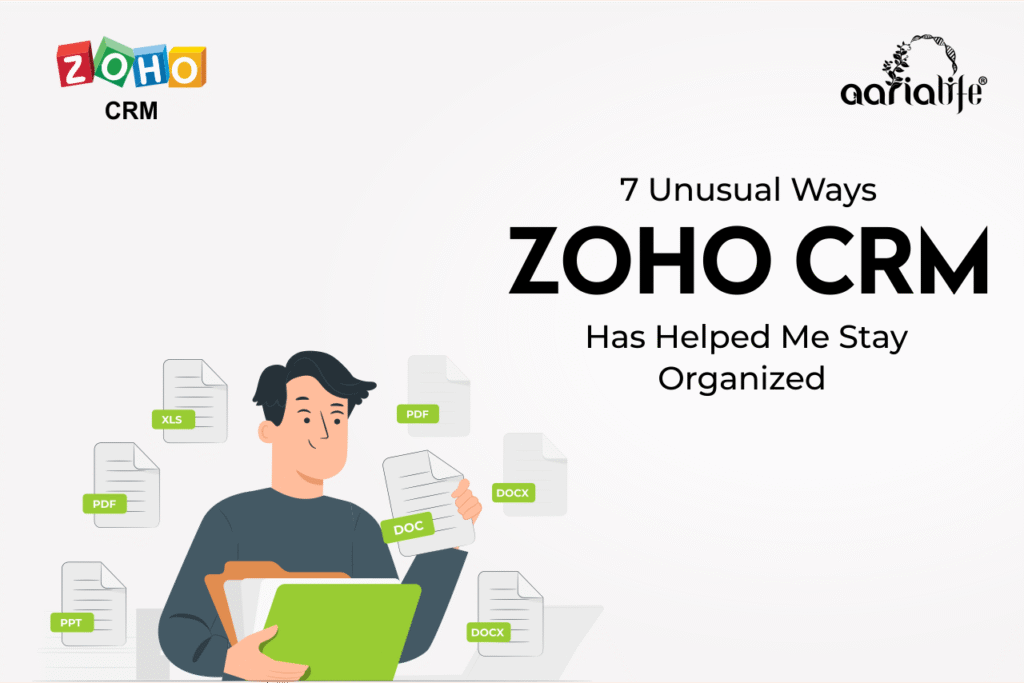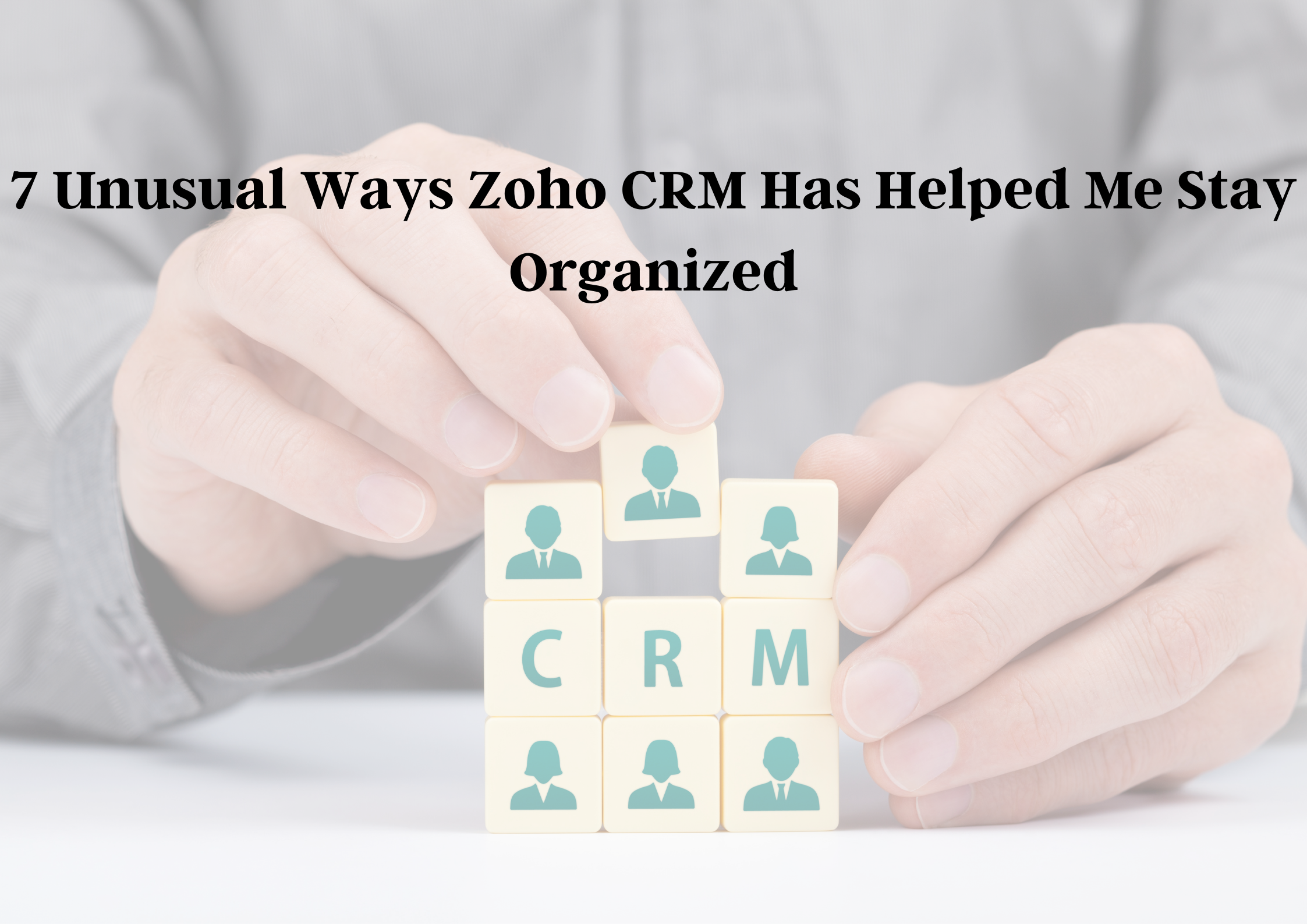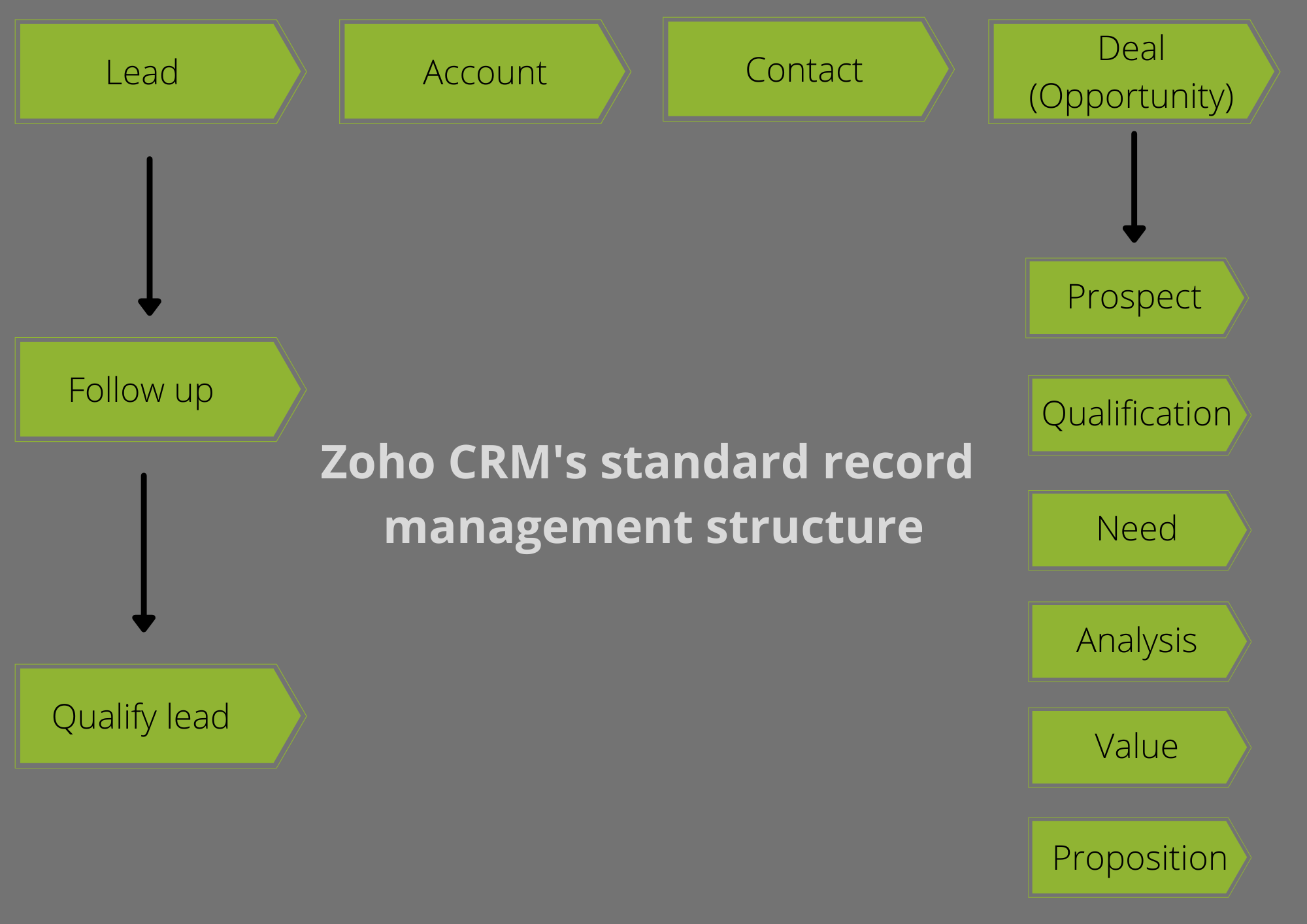Getting organized and staying organized with Zoho CRM
A CRM platform organizes and presents data to help better understand customers. Better message delivery and outreach can be accomplished with automation, so you can offer better, more efficient customer service. As a result, your teams can collaborate more easily and reduce silos.
The approach most businesses take to tracking customer information in the early stages is typically one of two things: one, you collect client information by hand in notebooks, scraps of paper, and the like; or two, you use spreadsheets, calendars, and tools such as Evernote to keep everything in sync.
Although each method has its merits, you will eventually have no choice but to stick to a method. Eventually, your business grows so big that spreadsheets and notebooks alone cannot effectively track and manage your clients and prospects.
In your role as the person who is responsible for building relationships with customers/clients and generating sales, you should constantly interact with your customers using a variety of methods and opportunities. Multiplying communication channels, from email and marketing campaigns to lunch or happy hour meet ups, requires a solid understanding of how each communication platform works and how you can utilize it to reach out to new potential customer or current customers. Marketing efforts and outreach strategies should be tailored to each customer’s preferred style of communication.
Here’s when Zoho Customer Relationship Management Software comes in.
Zoho CRM is a full-featured CRM suite with an extensive set of features and an extensive set of integrations. Zoho CRM boasts a huge feature set, including sales management, deal management, marketing automation, contact management, sales pipeline management, omnichannel interactions with customers, and analytics.
A Zoho Customer Relationship Management system is a digital tool (cloud-based CRM system) that can help you stay organized, identify sales opportunities and track your customer interaction as they progress through your specific sales pipeline. It is possible to monitor and respond to interactions across all stages of the customer lifecycle by using email, phone and social media channels.
Zoho Customer Relationship Management platform allow you to maintain consistent contact with your audience, through activity such as scheduled email campaign, email insights and appointment setting and centralized collection of all contact information.
Zoho CRM helps me stay organized in 7 odd ways
As a business owner, keeping business organized is crucial if you have multiple clients. It is one of the most difficult aspects of organizing and managing things to understand the best way to structure them.
1. Establishes an effective data structure
Let’s say you are tasked with building a spreadsheet that consists of all your accounts, contacts, and leads. How would you begin? Should leads and contacts be kept separate? Where would you put the column headers (data fields)? What is the best way to establish connections between organizations and their related contacts? Where should sales reps post updates and notes? It is not as easy as it may seem to organize customer data in a spreadsheet. Despite spreadsheets’ potential to help with basic information organization, the expectations of customers and the complexity of a growing company make spreadsheets less appropriate for everyday work.
As an alternative, you could use a CRM, such as Zoho. CRMs come with prebuilt data structures, so you don’t need to think about how to organize data. Here is an example of Zoho CRM’s standard record management structure:
Prospective customers are recorded in leads. In Zoho CRM, a lead goes through the follow-up process by sales reps, and if qualified, it is converted into an account, contact, and opportunity. Once opportunities are won, they become projects. Every lead, opportunity, contact, and project has a standard set of fields that ensure consistency of data collection.
Every step of the customer journey remains consistent. There’s no time wasted building reports, and nothing gets lost along the way. The entire process feeds into CRM system, which has already been reviewed by thousands of users before you. (If necessary, you can always customize your CRM.)
2. Stores and organizes data
Zoho CRM systems store and organize customer data, making it easy to share with various people in the company. One of the most important benefits of implementing a CRM system is the ability to create and distribute information or data about current or prospective clients.
By collecting data in one place, businesses can share it across locations and departments. Customer information such as this provides demographic, behavioral, and value-based customer segmentation.
A restaurant, for instance, can upload a customer’s profile. When the customer visits again, the wait staff will have access to the information concerning the customer’s preferences or allergies.
CRM systems also play a role in lead conversions. When speaking to prospective clients, knowing the last conversation that was had or where the lead is in the sales process ultimately helps close the deal.
Read more about- These 7 CRM Features Will Help You Close More Business
3. Manages everyday tasks and new client tasks.
Companies can gain the most benefit from CRM by building on or migrating data from existing systems. A business should stay up-to-date with the sorting of data information or determine what steps in the process need to be updated prior to implementation.
With a CRM system like Zoho, communication and collaboration can be enhanced. Data stored in a single location is easily accessible by team members for day-to-day tasks. In addition, CRM systems free up customer service team to focus on their customers’ needs.
Using Workflow Rules and automation tools, you can also automate your business processes and manage your data.
Zoho CRM systems allow managers to delegate tasks and assign them to team members, allowing them to track workflows easily. There can be times when smaller projects are neglected or understaffed in the midst of new client activities or a busy office period. CRM systems, though, allow designated employees to assign tasks to specific individuals and check in regularly on their progress.
With businesses growing, so do their workforces. To keep workforce data organized, easy to access, and up-to-date.
4. Align and Simplify knowledge sharing
CRM systems allow companies to share information smoothly with new employees. Rather than sharing various files or handwritten notes with new team members, these systems let businesses share organized customer data.
CRM systems simplify knowledge sharing by taking data from older team members and passing it along to the next generation. Tips and tricks for dealing with difficult customers can be deposited in these systems and communications among team members can be facilitated.
In addition, CRM systems gather relevant information in one location and designate who can access and share it. Having these two benefits allows companies to exercise caution when sharing data among team members.
5. Track lead sources and prioritize them
How do you know where the leads in your database come from? Do they come from paid advertising or organic search? Identifying where your leads come from can help you determine where you should focus your marketing and sales efforts. By knowing where your leads come from, you can also engage them better.
According to how much information you get from your leads sources, you can better categorize and prioritize them with Zoho CRM system. The more complete and accurate the leads that are entered into your system, the more valuable they are. In this way, your CRM system is more likely to be organized and accurate, so upgrading and maintaining it is easier.
6. Be organized, be efficient.
In order to help with future business endeavors, businesses can benefit from collecting and storing customer information. Information like this can be used for the next campaign or to see where improvements can be made. When a business reviews more data and organizes it better, it can create a unique experience for its customers. This can improve customer satisfaction and increase customer loyalty.
A customer needs to trust you to handle their business with care and consideration, and if you don’t have your business organized, that trust is compromised. Zoho CRM software connects calendars, contacts, history of interactions, and more, allowing your business to run smoothly, saving you time and energy as a result of connecting these diverse tools.
7. Multiple sales pipelines help you stay organized
Zoho CRM’s multiple sales pipelines are perhaps its most exciting feature. Multiple distinct sales pipelines can be set up for different products and services offered by your company, for geographic regions served by your company, among many other customizable parameters.
For sales team, this is a game changer, allowing you to customize each stage of your sales pipeline to fit your company’s needs, while in-depth reports help you analyze the performance of each pipeline. When you have multiple deals in your pipeline, Zia ( Artificial intelligence powered sales assistant) can help salespeople identify which deals are most likely to convert, and this will help you sell more effectively.
The Takeaway
Customer Relationship Management solution is a new way of thinking about the customer being a central part of the business, and all details are kept in one centralized database. This mainly focuses on customers’ relationship with the company. It’s important to have updated information and make sure to keep your CRM streamlined and protected from hacks. In the digital age, your data is your company’s most important asset. With Zoho CRM, you have an organized and secure way to safeguard your data.
For more information on this topic or to get answers to any questions you may have, feel free to contact us as our team of CRM experts is here to help.





